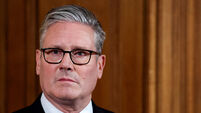New chapter of inspections in Iraq ‘on the way’
Leaders of the first arms inspectors since the last ones left in 1998 complaining that President Saddam Hussein would not cooperate, said Iraq’s fate - lifting of sanctions or war - depended on its hiding nothing.
Just hours before chief weapons inspector Hans Blix touched down at the main airport in Cyprus yesterday, US and British warplanes bombed an air defence system in northern Iraq after Iraqi forces fired at the jets in a no-fly zone, the US military said.
“We’re on our way to a new chapter of inspections in Iraq,” Mr Blix, a 74-year-old Swede, told reporters gathered for his arrival at Larnaca airport yesterday with Mohamed ElBaradei, director of the International Atomic Energy Agency.
There was a buzz of action at the three-star Flamingo Beach Hotel on Larnaca’s seafront as inspectors and other staff arrived on the Mediterranean island from all over the world. They were due to leave for Baghdad this morning.
British Foreign Secretary Jack Straw said Saddam would be making the mistake of his life if he stopped inspectors looking for biological, chemical and nuclear weapons.
“He mustn’t believe, because he would be making the mistake of his life, that he can mess the international community about yet again,” Mr Straw said yesterday.
Iraq’s Deputy Prime Minister Tareq Aziz said that while Iraq was ready to comply fully, the results would expose as lies United States charges that Iraq had weapons of mass destruction.
Mr Aziz warned that if the United States and Britain “wage a war against Iraq, consequences will be very bad to them and their friends in the region.
“We will provide immediate access. We have given instructions to all responsible people and many government areas to respond immediately to any request to enter their sites and inspect them,” he said.
But Mr Aziz said inspectors should not think they could just barge into sites: “When you go to a site, the site has a gate. The gate has to be opened and that who opens the gate should know who is coming. This is common sense.”
Mr Blix warned even a 30-minute delay in granting access to a suspect site would be regarded as a serious violation.
Mr Blix said the team of 30 inspectors who would travel with him and ElBaradei to Baghdad today would devote themselves first to working out logistics.
“There’s a lot to organise,” he said. “There are laboratories (to set up), a large number of jeeps, helicopters and a plane to be sorted out.”
He said formal inspections start on November 27, and he expects to have 100 inspectors drawn from more than 40 countries in Iraq by the end of the year.
Nothing will be regarded as off-limits including mosques and Saddam’s palaces. Soil, water and air samples will be tested.
The first significant test is a December 8 deadline for Iraq to submit a full account of all its banned weapons programs.
By January 27 next year, the inspectors must have given their first report to the United Nations Security Council.





